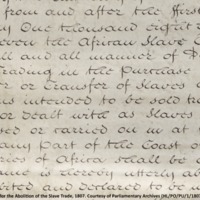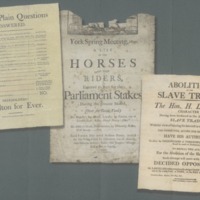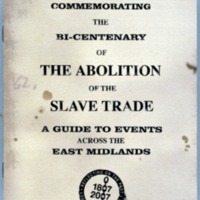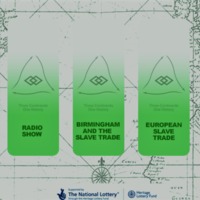
The Case for Immediate Not Gradual Abolition of Slavery
In the 1820s, the campaigner Elizabeth Heyrick became actively involved in door-to-door visits in Leicester in support of the anti-slavery cause and sugar boycotts. Her pamphlet ‘Immediate not gradual Abolition’ went into three editions during the first year of its publication in 1824. This exhibition focused on the life and work of Heyrick and in particular her efforts to abolish slavery. A Family Learning Day included ‘Elizabeth Heyrick’ in costume reading her pamphlet, storytelling, gospel music and an opportunity to sample food that would have been eaten by the enslaved.

Harewood 1807
2007 saw a number of different projects taking place at Harewood House in West Yorkshire, home of the Lascelles family. The bicentenary was used as an opportunity to explore the family connections with the transatlantic slave trade and the sugar plantations of the West Indies.
As part of a newly developed Learning Programme, leaflets were produced setting out the family connections to Barbados. 2007 also marked the bicentenary of the Yorkshire election in 1807 contested by William Wilberforce, Henry Lascelles (later 2nd Earl of Harewood) and Lord Milton. Competition between the candidates was fierce, based on issues such as Catholic Emancipation, poverty, workers' rights and abolition of the slave trade.

A Guide to Events Across the East Midlands
A guide to bicentenary activities and events in museums, archives and other venues across the East Midlands - Leicestershire and Rutland, Nottinghamshire, Northamptonshire, Derbyshire and Lincolnshire - was produced by Museums, Libraries and Archives East Midlands and Renaissance East Midlands. These events commemorated local connections to the abolitionist movement and to slavery. For example, Manor House Museum in Kettering produced a loans box containing material on William Knibb, a local abolitionist. Rothwell Arts and Heritage Centre produced an exhibition on the life of Rothwell-born missionary John Smith. Derby City Museums and Gallery worked with an artist and young people to explore Derby's industrial heritage and its links to the slave trade using The Silk Mill, Derby's Museum of Industry and History, as inspiration. Chesterfield Local Studies put together a touring exhibition to explore Derbyshire connections to the slave trade. A community commemorative event organised by Lincolnshire County Council and Lincolnshire African and Caribbean Support Group included a service of remembrance and the release of 200 'Freedom' balloons from Lincoln City Square on 24 March 2007.

Three Continents, One History: Birmingham, the Trans-Atlantic Slave Trade and the Caribbean
'Three Continents, One History' was a community project led by the African-Caribbean Millennium Centre (ACMC) to explore the historical links between Birmingham, the transatlantic slave trade and the Caribbean. Research focused on themes such as the region's manufacturing history and its links to slavery, the role of local regiments in keeping order on Caribbean plantations, the African presence in the West Midlands, and the region’s role in the abolitionist movement. The project aimed to examine the contemporary relevance of 1807 and the slave trade to Birmingham’s diverse communities, to contribute to a reshaping of the National Curriculum, to establish a physical archive and an interactive website. The research was shared with the public via weekly broadcasts on New Style Radio (a community radio station housed in ACMC) and simulcasts with Caribbean and African radio stations. Other events included conferences, dramatisations and discussion workshops.

Liberation Lullabies
The North East Cultural Diversity Arts Forum (NECDAF) is an umbrella organisation for arts and cultural organisations promoting arts practitioners from ethnic minority communities in North East England. Liberation Lullabies was their event to commemorate the Abolition Act at the Tyneside Cinema in Gateshead. The show featured Congolese singer Robert Maseko and his band Congobeat, and the Sun Dance group performing traditional African dance,